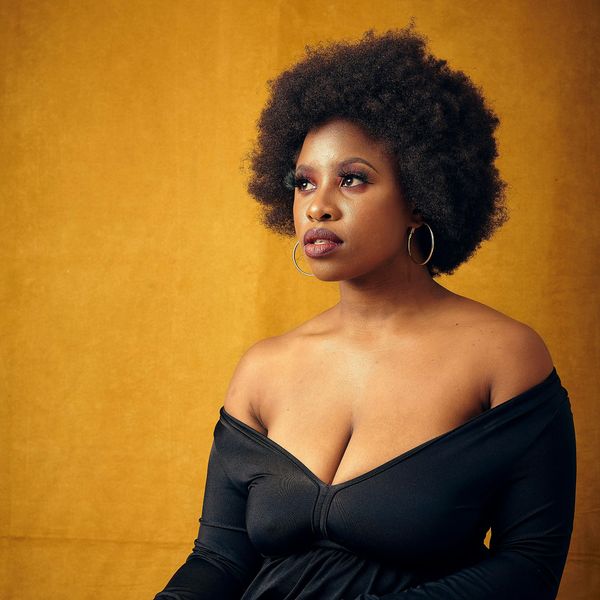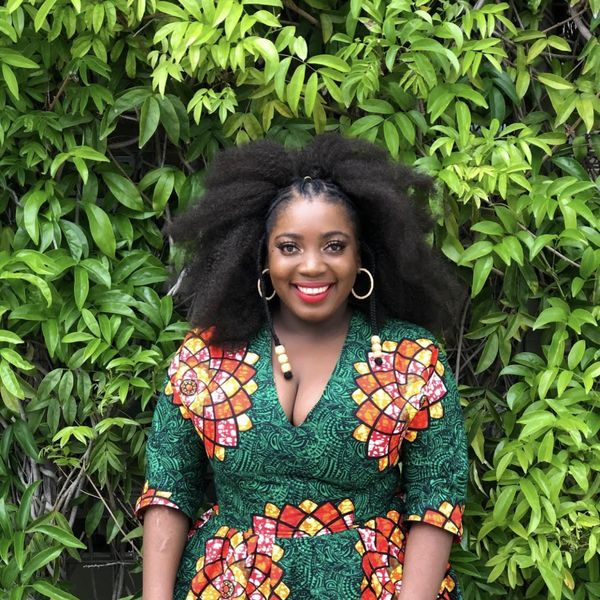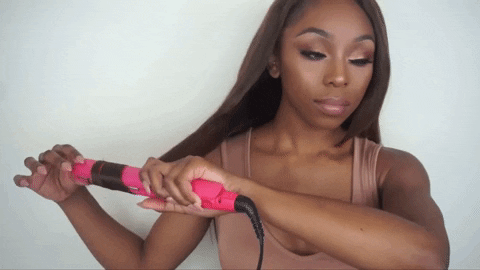
Something that trips me out about the two-day break known as the weekend is, when it comes to about 75 percent of the people I know, Saturday and Sunday are just as busy—if not a billion times busier—for them as the weekdays are. And ain't that a shame because, if you're constantly on the go, it's hard to give yourself the time to rest, recalibrate and even push reset on your life, so that you don't feel like you're constantly running on nothing more than fumes.
Let's do something to change this hamster wheel pattern, shall we? While the 10 things that I'm about to share might seem like a lot of work at first, if you start to apply them to your weekend routine, I think you'll find that each tip can actually help you to chill out easier and feel so much better about what is to come—every Monday.
1. Sleep In
Even though I grew up in a denomination where working from Friday sunset through Saturday sunset was an absolute no-no, in many ways, it didn't matter because going to church on the Sabbath meant getting up early enough to get to Sabbath school at church which sometimes meant arising at 7:30-8am. Then Sundays were about getting ready for Monday, so it was kind of a vicious cycle. Now that I am good and grown, I've got my own place and I've figured out how I want to do this whole spirituality thing for myself, I make sure that I rest on the weekends and that includes sleeping in on Saturday/the Sabbath. For how long? Shoot, until I feel like getting up because between writing deadlines, counseling folks and doula-ing, sometimes, I don't get the pleasure of doing this any other time of the week.
While it is a myth that you can catch up on lost sleep, being able to have at least one day when you can give yourself the opportunity to lounge around, even if it's just for a couple more hours than usual, that can make all of the difference in the world. Whether it's Saturday or Sunday, try and make it a priority. You'll notice a big difference if/when you do.
2. Catch Up with a Friend
If you're the kind of person whose body is on a clock and you're not able to sleep later, no matter how much you try, that still doesn't mean that you've gotta jump out of bed. Use the extra time to call a friend who you haven't spoken with in a while. The hustle and bustle of the week can make it challenging to connect with others. The weekend is a great time to really get quiet and focus on what your friend is saying and what you'd like to share too. And since you're not as much in a rush, if the call is about spending real quality time, you won't have to feel bad if you're only able to do this with them, once every couple of weeks or so.
3. Do Something You Enjoy
I can't exactly remember where I heard it but on some podcast that I recently checked out, one of the people said that one thing 2020 surprisingly revealed to them was they didn't really have any hobbies. The main reason why is because they actually enjoy what they do for a living so much that they never really contemplated finding something relaxing to do that was absolutely not work-related. In some ways, I can totally relate. Still, it really is wise—especially the older that you get—to find things to do that have little to do (at least directly) with your career path or even your purpose journey, so that you can de-stress and avoid purpose fatigue as much as possible. Besides, not only are hobbies a lot of fun, they can increase your sense of creativity, make you a more spiritual being, broaden your perspective, improve your memory and remind you of the benefits that come with staying in the present.
Sadly, some of us work so hard and so much that we feel guilty about doing things for the sheer enjoyment of it. Try and break out of that mindset. Hobbies can benefit you just as much as your profession does. Just differently.
4. Eat a “Fun Food”
Back when I had a trainer (many moons ago), something that I definitely looked forward to was having a "cheat day"; you know, the day when you can pretty much eat whatever you want. While I still try and be cautious of not showin' all the way out when it comes to my diet, Saturday is one day when I'm gonna pretty much do whatever I want and not think too much about it. Even if you don't decide to totally wile out over the course of an entire day or even one meal, try and eat something that puts a big smile on your face without obsessing too much about the fat or caloric content. Foods bring pleasure and life is too short not to have some of it in your life. Feel me? Somehow, I know that you do.
5. Pamper Yourself
It can be a mani/pedi. It can be a massage. It can be a facial. It can be purchasing a smell-good that makes you feel amazing. It can be soaking in the tub until you become a human prune. The weekend is 48 hours long and so there is absolutely no excuse for not carving out a good hour to pamper yourself. The reality is that a lot of us feel super burnt out and underappreciated during the week because we didn't make our own selves a top priority during the weekend. I'm sure you've heard that you can't take care of others if you don't take care of yourself. That's not just some self-help cliché. It is the absolute truth, sis.
6. Read a Chapter of a Book
This point right here, I'm actually preaching to the choir on. Ever since I was a little girl, I used to look forward to leisure reading. Now that I write for a living and I'm constantly researching information, sometimes the mere thought of reading a book can wear me out, no matter how much I may want to do it. I'm learning to break out of this mindset, though, since reading is calming, improves communication, teaching me new things, helps me to analyze better and become more of a critical thinker, increases my vocabulary and ultimately makes me a better writer too.
I'm pretty sure you've got a couple of books that you've been meaning to get to for a few months now, at least. If you're waiting to "have" time, it's never gonna happen. Even if it's just for an hour over the weekend, make the time to crack open a chapter or two. I don't know a single person who feels worse after reading a book. Not one.
7. Meal Prep
Although these days, a lot of people see meal prepping as something that folks who are on a strict diet or work out a lot do, many of us grew up in a household where preparing meals for the upcoming week was pretty much the norm. That said, one thing about the week is, no matter how much you try and prepare for it, sometimes it really can throw you for a loop. So, if you already prep—or even cook—3-4 main dishes over the weekend, all you've literally got to do, come Monday, is put things together in under 15 minutes or heat the food up. It can help to save time and keep you from wasting money on fast food when you're too tired to make anything.
8. Budget for the Upcoming Week
Speaking of wasting money, I recently read an article that was somewhat terrifying. It was entitled, "Survey: 65% of Americans Have No Idea How Much They Spent Last Month". When you add that little revelation to the fact that other reports say that, although roughly 67 percent of people have a budget, 33 percent don't maintain it, I bet you can get why this is on the list. I've actually shared before that I've got a friend whose accountant has had him on a strict budget for a few years now and it's all because he literally wastes thousands a year on eating out.
Think about it. If you spend $10 per meal a day and you do it five days a week, that's $150. 150 times 52 weeks (that are in a year) equals out to be—lawd, y'all—$7,800. You could buy a car for that amount!
When you've got a budget in place, you'll be amazed how much you can make twenty bucks stretch. Without it, it can be gone in five minutes with nothing to really show for it. Yes, a monthly budget is cool yet breaking that down even further into a weekly one (and then actually honoring it) can help you to save a whole lot of your coins.
9. Put Together a To-Do List
How many weeks have gone by and you've asked yourself where did the time go? Sometimes, it can be really easy to feel totally stressed out or completely defeated if you let the week happen to you rather than you choosing to take control over it. This is where a to-do list comes in. If you put down 5-7 things, in order of importance, that you'd like to accomplish each weekday and then you actually follow through on them, you'll be amazed by how at peace you'll feel when it's time to close your eyes at night. Not only that but to-do lists can help you to remain organized and focused, so that when "other things" come up, they won't distract you away from what you've already decided needs to be done.
10. Build Your Vision
Unfortunately, 85 percent of people absolutely hate their jobs. And since we spend most of our waking hours at work, that truly can be a grueling existence. You were put on this planet to do more than pay bills. You were even put on this planet to do more than blow someone else's company up. That's why it's so important to take out at least an hour, each and every weekend, to figure out what you want to do with your purpose, gifts and talents—how you can make them work for you instead of just for someone else. If you devote 60 minutes a weekend, there's no telling how prepared you will be to either leave your current gig or build a platform on the side that can make look at your job as a way to fund your own vision. Whether it's reading a book, finding a mentor, taking a class on a site like Skillshare, designing a website or blog, writing a professional mission statement, putting together a 12-month strategy to leave your current position or coming up with ways to use your social media beyond just laughing at/with Black Twitter—use some down time to put your vision together.
If you do, you could see life really different in a few months. All because you did what you should do on the weekends—make some of that time be all about…YOU.
Join our xoTribe, an exclusive community dedicated to YOU and your stories and all things xoNecole. Be a part of a growing community of women from all over the world who come together to uplift, inspire, and inform each other on all things related to the glow up.
Featured image by Shutterstock
This Is How To Keep 'Holiday Season Stress' From Infecting Your Relationship
Hmph. Maybe it’s just me, but it seems like there is something really weird happening in the fall season air (because winter doesn’t officially begin until December 21) that cuddle season is in full swing while break-up season is as well. In fact, did you know that break-ups are so popular during the holiday season that December 11 is deemed Break-Up Day?
The reasons why relationships shift around this time vary; however, I did both roll my eyes and chuckle when I read that a very popular one is because it’s an easy way to get out of getting one’s significant other a Christmas present. SMDH.
Anyway, I personally think that the less shallow folks out here may contemplate calling things “quits” or they at least distance themselves a bit from their partner (and what I’m referring to is serious relationships) due to all of the stress and strain that oftentimes comes with the holidays whether it be financial, familial, due to their tight schedules or something else.
Listen, I would hate for you and your man to miss the fun and happiness of experiencing this time of year, all because you are so overwhelmed or irritated that you can’t really enjoy it. That’s why I have a few practical tips for how to avoid allowing the typical holiday season stress from INFECTING your relationship.
Manage Your Expectations
 Giphy
GiphyUnmanaged expectations. If there is a main reason why the holiday season tends to be so stress-filled for so many people, I’d bet good money that this is the cause. And when you’re in a long-term relationship, expectations can manifest themselves in all sorts of cryptic and/or unexpected ways. You might have relatives who assume that you are going to be with them for Thanksgiving or Christmas when you have other plans in mind. You might be thinking that you are going to spend one amount for presents while your man is thinking something totally different. When it comes to scheduling, your signals may be crossed.
And you know what? To all of these scenarios, this is where clear and consistent communication come in. Don’t assume anything. Don’t dictate anything either. From now until New Year’s, mutually decide to check in once a week, just to make sure that you are both on the same page as it relates to the holidays and what you both are thinking will come along with it. The less blindsided you both feel, the less stressed out you will be. Trust me on this.
Set (and Keep) a Budget
 Giphy
GiphyOkay, so I read that last year, 36 percent of Americans incurred some type of holiday-related debt. Hmph. Last year, there was still some sense of normalcy in this country, chile, so I can only imagine what finances are gonna look like over the next several weeks. That said, since I don’t know a lot of people who don’t find being broke stressful, make sure that you and your bae set a budget and then stick to it this year — no ifs, ands or buts.
Because really, y’all — it doesn’t make sense to deplete savings and/or max out credit cards for a few days of giggles only to be damn near losing your mind because you don’t know how to make ends meet come Dr. Martin Luther King, Jr. Day.
And by the way, this tip doesn’t just speak to things like food and gifts; I also mean travel. If it doesn’t make a ton of sense (or cents) to be all over the place this year — DON’T BE.
Keep Matthew 5:37 at the Forefront
 Giphy
GiphyIf off the top of your head, you don’t know what Matthew 5:37 says, no worries, here ya go: “But let your ‘Yes’ be ‘Yes,’ and your ‘No,’ ‘No.’ For whatever is more than these is from the evil one.” That verse right there? Oh, it’s a boundaries lifesaver! I say that because do you see “maybe” or “I’ll think about it” in there? Nope. LOL. It says that you should tell people “yes” or “no” and leave it at that — and that complements Anne Lamott’s quote, “’No’ is a complete sentence” impeccably well. Yeah, you’ve got to remember that anything beyond a yes or no to a request is privileged information; you don’t owe anyone details or an explanation.
Besides, if you are really honest with yourself, when someone asks you something and you give a “Umm, let me think about it” kind of reply, more times than not, you already know what your answer is going to be — so why not let you both off of the hook? Give your response. Commit to that. And let everyone (including yourself) get on with their lives and schedules.
I promise you that when it comes to those holiday parties, you are pissing more folks off by not RSVP’ing or doing so and not showing up than just saying, “Thank you but not this year” off the rip.
Remember That Your Personal Space Is Privilege Not a Right
 Giphy
GiphyA friend of mine recently bought a new house and invited me over to come see it. He’s a single man with no children, so as I was taking in all of the space that he had, especially as I walked through his finished basement, I joked about relatives coming to live with him. “Hell no” and “absolutely not” were pretty much his immediate responses as he went on to say that some folks even had the nerve to be offended when he told them that he had no intentions on taking DNA in.
Ain’t it wild how people think that your stuff is their right? And yes, that brings me to my next point. Your home is your sanctuary space. If you want to host folks this year — cool. If not, ALSO COOL. Please don’t let folks (family included) guilt you into how they want you to act or even into what they would do if the shoe was on the other foot. You are not them — and as one of my favorite quotes states, “If two people were exactly alike, one of them would be unnecessary.” (A man by the name Larry Dixon said that.)
Hell, my friends? They know that I am good for sending them random things that they need or even want all throughout the year. Coming over to hang out at my pace, though. Uh-uh. Chalk it up to being a card-carrying member of the ambivert club yet I like keeping my living space personal — and I sleep like a baby, each and every night, for feeling that way.
Always remember that your space, your time, your resources, your energy and shoot, yourself period (including your relationship), are all things that are your own. You get to choose how, when and why you want to share them. The holiday season is certainly no exception.
Cultivate Some “You Two Only” Traditions
 Giphy
GiphyIt’s not uncommon for some couples to hit me up after the holiday season to “detox.” Sometimes it’s due to the financial drama (and sometimes trauma) that they experienced. Sometimes it’s because they allowed their relatives (especially in-laws) to get more into their personal business than they should’ve. More than anything, though, it tends to be because they didn’t get enough quality time together and so ended up feeling “disconnected.”
Please don’t let that happen. Listen, I’m not even a holidays kind of woman and yet, I will absolutely sit myself down with some hot chocolate and chocolate chip cookies to enjoy a Hallmark holiday film or two. Aside from the fact that most of them are lighthearted and sweet, I also like that they usually focus on couples loving on each other amidst all of the holiday beauty and ambiance — which is something that all couples should set aside some time to do.
Maybe it’s a vacation. Maybe it’s a staycation. Or maybe it’s my personal favorite, A SEXCATION. Whether it’s for a few days, the weekend or even overnight — don’t you let the holidays go by without setting aside time for you and your man to celebrate one another. Don’t you dare (check out “Are You Ready To Have Some Very Merry 'Christmas Sex'?”).
GET. SOME. REST.
 Giphy
GiphyI once read that 8 out of 10 people get stressed out over the holidays and 3 out of 10 lose sleep during to it — and when you’re stress-filled and sleep-deprived, that can absolutely lead to hypersensitivity, making mountains out of molehills and even not being in the mood for sex.
Your relationship can’t afford to go through any of this, so definitely make sure to prioritize rest. I don’t care how unrealistic it might seem during this time, sleep should never be seen as a luxury; it will always and forever be a great necessity.
That said, try to get no less than six hours of shut-eye in (check out “6 Fascinating Ways Sex And Sleep Definitely Go Hand In Hand”) and even ask your bae to take a nap with you sometimes (check out “Wanna Have Some Next-Level Sex? Take A Nap, Sis.”). Not only will sleep help to restore your mind, body and spirit but, when it’s with your partner, it’s an act of intimacy that can make you both feel super connected, even in the midst of what might feel like chaos.
___
Holiday season stress is real. Still, never give it the permission or power to throw your relationship off. Put you and your man first and let the holidays be what they are gonna be, chile.
Let’s make things inbox official! Sign up for the xoNecole newsletter for love, wellness, career, and exclusive content delivered straight to your inbox.
Featured image by Shutterstock
It’s probably been over the past 2-3 years that I’ve become hyper-focused when it comes to applying certain chemical exfoliants known as acids to my skin. Personally, I’ve come to really appreciate ones like mandelic acid and hyaluronic acid because they have a way of softening my skin, brightening it up and really evening out my complexion overall.
In fact, on my skin, they have been so effective that they have caused me to wonder what would happen if I applied some of them to my hair too — and boy, was it an experiment that paid off big time!
If, while on your continual journey to get the best out of your own tresses, you’d like to learn how to get them healthier than it’s ever been, I’ve got seven acids that are typically known for skin use that can be just as beneficial to your hair as well.
1. Salicylic Acid
When it comes to your skin, salicylic acid is beta-hydroxy acid that is great for your skin if you’re looking for something that will exfoliate it, clear out your pores and dissolve dead skin cells. In fact, this is why it’s an acid that is quite popular when it comes to treating acne.
Your hair will enjoy salicylic acid because, if you’re looking to remove product build-up, you want to soothe an itchy or irritated scalp or you’ve got some dandruff flakes that are totally driving you up the wall, salicylic acid has the ability to treat all of this. Either purchasing a shampoo that contains this ingredient or adding it to your favorite scalp scrub is probably the most effective way to get the most out of it.
Just make sure that if your scalp is sensitive or dry that you approach with caution. In these instances, it could end up irritating your scalp more than helping it out, so use a very little bit in the beginning to make sure that it vibes with you.
2. Lactic Acid
Lactic acid is an alpha hydroxy acid that can help to even out your skin tone as well as slow down the signs of aging. The properties in it help to do this by reducing hyperpigmentation and boosting collagen production in your skin as well as keeping it hydrated.
Why is it great for your locks? For one thing, lactic acid is considered to be a humectant. This means that it pulls water from the air so that your hair is able to remain moisturized.
Another thing that makes it a winner is the fact that lactic acid breaks down dead skin cells on your scalp (so that your hair follicles are able to flourish), it can help to soften and detangle your hair (making it a helpful addition on your wash days) and it also helps to protect your tresses from heat styling tools and UV damage. Applying a hair rinse that’s made up of part lactic acid and part water can work wonderfully (so long as you apply it once a month, tops; more than that might be too “intense” for your hair strands).
3. Glycolic Acid
Glycolic acid is a water-soluble alpha hydroxy acid that is actually made from sugar. Your skin will adore it because it smooths the appearance of fine lines and wrinkles, improves the texture of your skin, gently exfoliates, clears your pores and brightens up your complexion overall.
The reasons why you should consider this acid for your hair is because it helps to keep your scalp youthful (and yes, there is such a thing; check out “Your Scalp Ages Six Times Faster Than Your Face. Why It Matters.”), removes excess sebum (that could be clogging up your hair follicles) and it helps to keep your hair moisturized. Your best bet here is to make it a part of your pre-shampooing ritual.
4. Succinic Acid
Succinic acid is an acid that is made from sugar cane and contains antimicrobial and anti-inflammatory properties. Although it doesn’t exactly exfoliate (like many of these other acids do), it can still be beneficial to your skin when it comes to reducing the kind of irritation that is associated with eczema, decreasing the bacteria that leads to breakouts and keeping your skin pretty hydrated.
As far as your hair goes, this is an acid that is worth trying out because it helps to balance the sebum that is on your scalp, remove dead skin and product build-up that can irritate your scalp and clog your hair follicles and, succinic acid is also beneficial when it comes to reducing dandruff and helping to prevent hair loss. Most people tend to apply this as a serum.
5. Hyaluronic Acid
I’ve officially sung the praises of hyaluronic acid on this platform before. One example is via the article, “Why Your Skin, Hair, And Nails Need Hyaluronic Acid Like...Yesterday.” On the skin tip, hyaluronic acid is great because it deeply hydrates your skin, contains anti-aging properties and can even bring relief to vaginal (including vulvar) dryness.
Your hair will adore this particular acid because it aids moisture to it (including your hair follicles), will help to improve your hair’s texture and it also soothes scalp dryness, nurtures the cuticles of your tresses and decreases frizz. Using a serum rich in this acid as a pre-poo or as a leave-in conditioner is recommended.
6. Azelaic Acid
If you’ve never heard of azelaic acid before, this is your lucky day. It’s a dicarboxylic acid that, when it comes to skincare (and hair care) products, is usually synthetic. Anyway, if you are looking for a way to reduce inflammation, even skin tone after a breakout or if you want to use an exfoliant that will improve the texture of your skin overtime, you might want to give this acid a shot.
This one makes the list as far as your hair is concerned because, if achieving more inches is your current focus, azelaic acid might come in handy. That’s because it is able to strengthen your hair, thicken your strands and also stimulate hair growth from within your hair follicles.
7. Glutamic Acid
Glutamic acid is actually a type of amino acid. Skin-wise, it’s great for deeply hydrating your skin as well as protecting it from pollutants and damaging UV rays. Also, if you’re looking for an acid that treats skin dryness or “tightness,” this could be the answer to your prayers.
Since glutamic acid is also considered to be a humectant, it’s another acid that can moisturize your hair. As a result, it can decrease breakage while helping your hair to feel smooth and look shiny.
BONUS: Amino Acids
Speaking of amino acids and hair, please try to keep some amino acids in your diet at all times. The reason why is because, since your hair is made up of mostly protein (keratin, to be exact), amino acids are pretty darn effective when it comes to helping you to maintain the overall health and well-being of your hair.
Ones to prioritize include proline (it boosts collagen so that your hair strands can maintain flexibility); arginine (it increases blood flow to your hair follicles so that they can receive the nutrients that they need); cysteine (it helps to keep your hair follicles healthy); alanine (it helps your system to produce more collagen), and isoleucine (it strengthens the tissues that help to make up your hair strands). All of these are available in supplement form or you can use Google to see which foods contain them.
___
Although it might initially seem odd to apply acid to your hair, as you can see, certain ones will work miracles for it. So, test them out to see which one tickles your fancy.
Hell, since they work for your skin as well — it’s a two-for-one deal that is worth every penny!
Let’s make things inbox official! Sign up for the xoNecole newsletter for love, wellness, career, and exclusive content delivered straight to your inbox.
Featured image by Shutterstock













